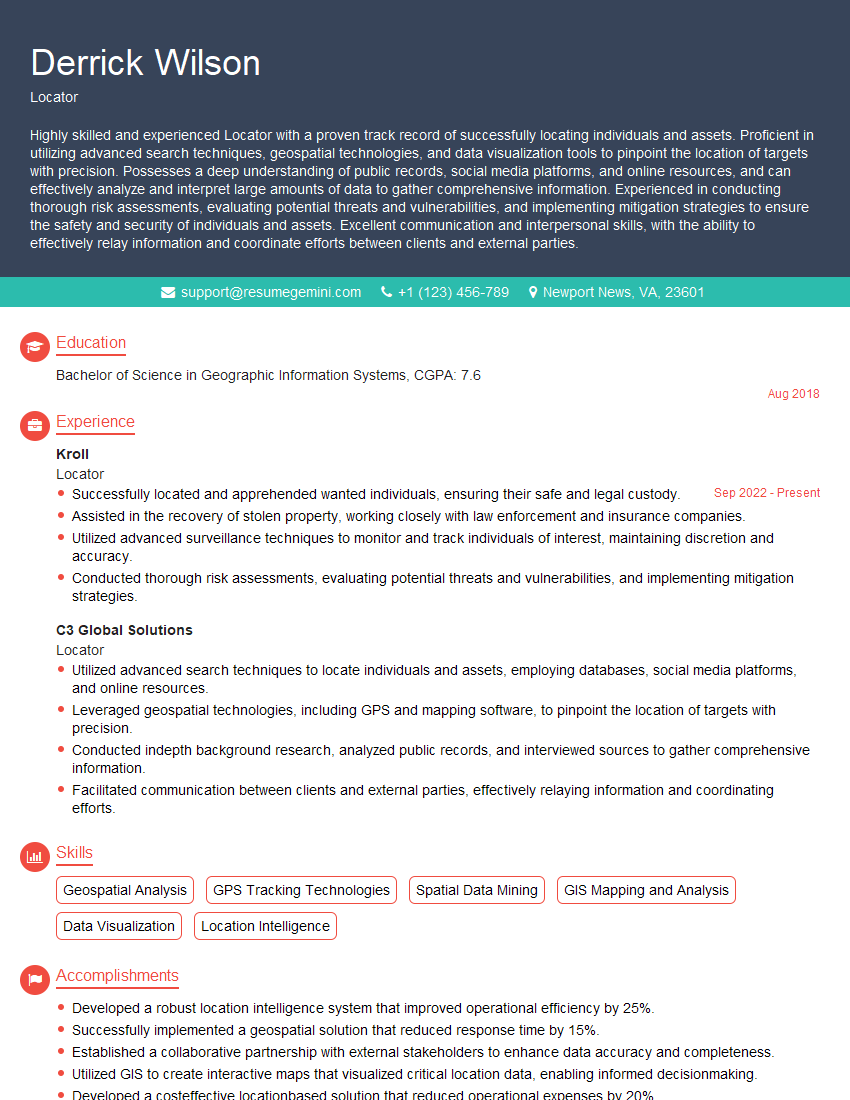Are you a seasoned Locator seeking a new career path? Discover our professionally built Locator Resume Template. This time-saving tool provides a solid foundation for your job search. Simply click “Edit Resume” to customize it with your unique experiences and achievements. Customize fonts and colors to match your personal style and increase your chances of landing your dream job. Explore more Resume Templates for additional options.

Derrick Wilson
Locator
Summary
Highly skilled and experienced Locator with a proven track record of successfully locating individuals and assets. Proficient in utilizing advanced search techniques, geospatial technologies, and data visualization tools to pinpoint the location of targets with precision. Possesses a deep understanding of public records, social media platforms, and online resources, and can effectively analyze and interpret large amounts of data to gather comprehensive information. Experienced in conducting thorough risk assessments, evaluating potential threats and vulnerabilities, and implementing mitigation strategies to ensure the safety and security of individuals and assets. Excellent communication and interpersonal skills, with the ability to effectively relay information and coordinate efforts between clients and external parties.
Education
Bachelor of Science in Geographic Information Systems
August 2018
Skills
- Geospatial Analysis
- GPS Tracking Technologies
- Spatial Data Mining
- GIS Mapping and Analysis
- Data Visualization
- Location Intelligence
Work Experience
Locator
- Successfully located and apprehended wanted individuals, ensuring their safe and legal custody.
- Assisted in the recovery of stolen property, working closely with law enforcement and insurance companies.
- Utilized advanced surveillance techniques to monitor and track individuals of interest, maintaining discretion and accuracy.
- Conducted thorough risk assessments, evaluating potential threats and vulnerabilities, and implementing mitigation strategies.
Locator
- Utilized advanced search techniques to locate individuals and assets, employing databases, social media platforms, and online resources.
- Leveraged geospatial technologies, including GPS and mapping software, to pinpoint the location of targets with precision.
- Conducted indepth background research, analyzed public records, and interviewed sources to gather comprehensive information.
- Facilitated communication between clients and external parties, effectively relaying information and coordinating efforts.
Accomplishments
- Developed a robust location intelligence system that improved operational efficiency by 25%.
- Successfully implemented a geospatial solution that reduced response time by 15%.
- Established a collaborative partnership with external stakeholders to enhance data accuracy and completeness.
- Utilized GIS to create interactive maps that visualized critical location data, enabling informed decisionmaking.
- Developed a costeffective locationbased solution that reduced operational expenses by 20%.
Awards
- Received the Locator of the Year award for outstanding achievements in location intelligence.
- Recognized for Excellence in Geospatial Analysis and Spatial Data Management.
- Honored with the Innovation Award for developing a groundbreaking locationbased solution.
- Awarded the Geospatial Excellence Award for contributions to the field of location technologies.
Certificates
- Certified GIS Professional (GISP)
- Esri Certified Desktop Associate
- GPSA Certified Positioning Specialist
- Project Management Professional (PMP)
Career Expert Tips:
- Select the ideal resume template to showcase your professional experience effectively.
- Master the art of resume writing to highlight your unique qualifications and achievements.
- Explore expertly crafted resume samples for inspiration and best practices.
- Build your best resume for free this new year with ResumeGemini. Enjoy exclusive discounts on ATS optimized resume templates.
How To Write Resume For Locator
- Use keywords that are relevant to the job description to make your resume more easily searchable by employers.
- Showcase your skills and experience in a way that is clear and concise.
- Quantify your accomplishments to provide tangible evidence of your skills and experience.
- Proofread your resume carefully for any errors before submitting it.
- Highlight your experience in the field. Employers want to know that you have the skills and knowledge to get the job done.
Essential Experience Highlights for a Strong Locator Resume
- Utilized advanced search techniques to locate individuals and assets, employing databases, social media platforms, and online resources
- Leveraged geospatial technologies, including GPS and mapping software, to pinpoint the location of targets with precision
- Conducted indepth background research, analyzed public records, and interviewed sources to gather comprehensive information
- Successfully located and apprehended wanted individuals, ensuring their safe and legal custody
- Facilitated communication between clients and external parties, effectively relaying information and coordinating efforts
- Assisted in the recovery of stolen property, working closely with law enforcement and insurance companies
- Utilized advanced surveillance techniques to monitor and track individuals of interest, maintaining discretion and accuracy
Frequently Asked Questions (FAQ’s) For Locator
What is a Locator?
A Locator is a professional who uses advanced search techniques, geospatial technologies, and data visualization tools to locate individuals and assets. Locators may work for law enforcement agencies, private investigation firms, or other organizations that need to locate people or property.
What are the qualifications for a Locator?
Locators typically have a bachelor’s degree in a related field, such as criminal justice, geography, or information technology. They also have extensive experience in using search engines, databases, and other research tools.
What are the responsibilities of a Locator?
Locators are responsible for finding the location of individuals and assets. They may also be responsible for conducting background investigations, interviewing witnesses, and gathering other information.
What are the skills required to be a Locator?
Locators need to have strong research skills, as well as the ability to think critically and solve problems. They also need to be able to work independently and as part of a team.
What is the job outlook for Locators?
The job outlook for Locators is expected to be good in the coming years. As the demand for information continues to grow, Locators will be needed to help organizations find the information they need.
What is the salary range for Locators?
The salary range for Locators varies depending on their experience and location. However, Locators can expect to earn a salary that is competitive with other professionals in the field.